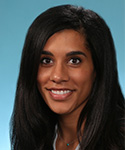October 4th, 2018
Diapers During Residency
Cassandra Fritz, MD
I had the fascinating experience of interviewing for residency at 20+ weeks’ pregnant. Although a number of people told me that I was doomed, I found the experience to be quite enlightening. Since I couldn’t hide the fact that life outside medicine was going to be important to me during residency, I felt empowered to ask the “don’t ask” questions during my interviews. What did I have to lose? The perk of interviewing while pregnant was that it was very apparent which programs were going to be supportive of work-life balance and which programs were trying to wish away my protruding belly. This experience helped me to determine where I was going to have the most support, academically and personally.
 Some people find the thought of having children during residency unimaginable, but a growing number of us not only contemplate having children while in training, but decide to take actually the plunge into changing diapers. Pregnancy during residency is not a new concept. In 1986, a study reported that 12% of women from Harvard-affiliated programs had at least one pregnancy during residency training (N Engl J Med 1986; 314:418). Jump forward to 2013–2016, when another study showed that approximately 40% of residents had or were planning to have children during residency (Acad Med 2016; 91:972). Although diapers during residency continues to gain traction, residency programs have a paucity of standard guidelines that outline how to best support residents with children. So, do residents feel like they are blazing a new trail at their program if they decide to have children?
Some people find the thought of having children during residency unimaginable, but a growing number of us not only contemplate having children while in training, but decide to take actually the plunge into changing diapers. Pregnancy during residency is not a new concept. In 1986, a study reported that 12% of women from Harvard-affiliated programs had at least one pregnancy during residency training (N Engl J Med 1986; 314:418). Jump forward to 2013–2016, when another study showed that approximately 40% of residents had or were planning to have children during residency (Acad Med 2016; 91:972). Although diapers during residency continues to gain traction, residency programs have a paucity of standard guidelines that outline how to best support residents with children. So, do residents feel like they are blazing a new trail at their program if they decide to have children?
If you decide diapers are going to be in your near future, here is some advice:
- Be organized! ’Cause mama doesn’t have time not to be
You will be wearing many hats: resident, mommy/daddy, wife/husband/partner — and all of these roles will require  your attention. My personal secret was to compartmentalize my life as much as possible. When I was home, it was family time until my kids went to sleep. While I was at work, I focused on work. But compartmentalization doesn’t get you out the door on time in the morning, organization does! Our family has a routine, and we live and die by that routine. When I walk in from work each day, I don’t pass go until bottles and lunches for the next day are prepared. Organization at home will allow you to be efficient, on time, and present at work.
your attention. My personal secret was to compartmentalize my life as much as possible. When I was home, it was family time until my kids went to sleep. While I was at work, I focused on work. But compartmentalization doesn’t get you out the door on time in the morning, organization does! Our family has a routine, and we live and die by that routine. When I walk in from work each day, I don’t pass go until bottles and lunches for the next day are prepared. Organization at home will allow you to be efficient, on time, and present at work.
- Don’t be afraid to ask for help, because the only way to do it all is with A LOT of help.
I am blessed that I have a great support system around me. If I know my schedule won’t allow me to pick up my kids from daycare at a reasonable time, I have a list of people who are happy to spend time with my boys. I don’t worry about how this looks to outsiders, or the fact that I probably have the longest list of people on my “approved for pick up list” at daycare. Who cares? What is important is that my boys are well cared for and loved. Having a strong support system means that I rarely have to call off from work because of child care issues. Because, let’s face it, we still work in an environment when “mommy issues” at work are frowned upon. Although it was initially hard for my type A personality to let go and ask for help, it is the only way to have it all.
- Advocate for yourself: Understanding the difference between equity and equality is imperative
 Traditionally, I think we fall into a trap where we think that everything should be equal. If resident A gets a thing, then so should resident B. But in truth, maybe resident B doesn’t need what resident A needs. We need to move to a system that values equity over equality. This is not intuitive, so when you are resident parent, you must be your own advocate. You are inevitably going to have different concerns than your co-residents who don’t have children and/or significant others. There was one point during my intern year when my husband was traveling for work, and I made it a priority to pick up my son from daycare on time each evening (other than call days). Although my rush to get out of the hospital at the end of the day could have been seen as a negative, I had a co-intern and a senior resident who were extremely supportive, because I communicated with both of them what my needs were that week. Obviously, I always got my work done, but our team dynamics were improved because our open lines of communication were open. Fast forward to my second year, when another co-resident fell ill and needed coverage during an ICU month: I happily volunteered to cover his shifts. When you and your program focus on equity over equality, everyone can get what they need to be successful. It really does all balance out.
Traditionally, I think we fall into a trap where we think that everything should be equal. If resident A gets a thing, then so should resident B. But in truth, maybe resident B doesn’t need what resident A needs. We need to move to a system that values equity over equality. This is not intuitive, so when you are resident parent, you must be your own advocate. You are inevitably going to have different concerns than your co-residents who don’t have children and/or significant others. There was one point during my intern year when my husband was traveling for work, and I made it a priority to pick up my son from daycare on time each evening (other than call days). Although my rush to get out of the hospital at the end of the day could have been seen as a negative, I had a co-intern and a senior resident who were extremely supportive, because I communicated with both of them what my needs were that week. Obviously, I always got my work done, but our team dynamics were improved because our open lines of communication were open. Fast forward to my second year, when another co-resident fell ill and needed coverage during an ICU month: I happily volunteered to cover his shifts. When you and your program focus on equity over equality, everyone can get what they need to be successful. It really does all balance out.
At the end of the day, if you are ready to become a parent, don’t let residency stop you. If you are in the special position of choosing a program while expecting a child, ask those “don’t ask” questions during your interview to gauge programs’ receptivity to resident parents. I promise you, they will show their hand.
Some might say I am too positive and naïve, but I think we can do it all (with a lot of help and the “right” supportive program). When you are a doctor, there is never going to be a “best” time to have children. Finding and doing what makes you happy both in and out of the hospital is an important aspect of developing resiliency and experiencing joy during these 3 hard years. Although you will laugh when non-parent residents complain about sleep deprivation, you will also find that babies can teach you a lot about yourself and keep you grounded during this journey. Personally, my boys brought me so much joy during my training years that I truly can’t imagine doing residency without changing diapers. So, as far as my personal belief about changing diapers during residency: do it well and do it often because no one needs a “blow out” right before walking into rounds.



You are one amazing woman, Cassie. Loved reading what you wrote. Any patient of yours is most lucky to have you as the doc!! Love you.
That is a selfish “plan”, and it negatively impacts everyone in your program. You as well. I am sure that you are a weak physician, as our skill set, and fund of knowledge is born through hours upon hours of intense, focused clinical experience! Don’t be so glib about it, rather you should be apologetic!
This is a ridiculous comment. How can you be “sure” she is a weak physician? One of the key skills in our skill set you seemed so worried about is observation. Observation here would tell you the writer is a chief resident at Wash U in her program so obviously she is not a weak physician and her program feels she is strong enough to help the program that she is “negatively impacting.” If anything she is likely more grounded and has a better appreciation of the social factors that play into patient’s health because of her changing diapers during residency. I would much rather see a physician as a patient and have a colleague with a better understanding of these social factors, than see or work with those who think that women in residency should apologize for having children, negatively impact their team, and go online to make misogynistic asinine comments such as this one.
What a rude thing to say. I’m sure you’re a weak physician as our role requires compassion, understanding, and flexibility.
I really hope this is sarcasm. What a terrible attitude. “I am sure that you are a weak physician.”??? Maybe she’s a BETTER physician because of her superior time management and organizational skills.
Being a mom and surgical resident certainly helped me work more efficiently and have intentional, quality time with my baby and husband during my days and evenings off. I graduated from a leading program with great confidence in my training and surgical skills. Nothing about me as a surgeon or a physician is “weak” due to juggling these responsibilities; if anything it made me better and stronger. I have no doubt the same is true for you. Way to go, Mama!
I’m going to assume this is sarcasm?
Kcramer, female physicians have excellent outcomes. Your opinion is based on ignorance and is absolutely wrong. Maybe being another dies make us more efficient. Whatever the reason, I assure you we are still STRONG, excellent clinicians. Anything you can do we can do breastfeeding (and changing diapers).
Fabulous insight and advice! I chose to have 1 child during med school and one during residency. I was 6 months pregnant on fellowship interviews. Having a family through it all was tough, but they were a constant reminder of why I was doing what I was doing. Having it all is hard, but it’s the only way to have it.
No, it is not a selfish plan in the least.
It is part of life, and so it is a part of learning.
Someone once said, “Life happens when you’re busy making other plans”! You need to deal with it just as you need to deal with everything else coming your way in your chosen, challenging, changing, social & clinical situation.
If you can live as well as learn, then you’ll be a better physician!
I write from far more experience than Kcramer and it is evident from the “glib” comments that it is Cassie for whom apologies are unnecessary!
I agree with Mary Ann Pollitt.
Kcramer-
What an asinine comment. I will waste no further words.
Dr. Fritz-thank you for your insight! While I did not have children during residency, I can say for a fact that becoming a mother has made me a better doctor. Work it like the boss that you are!
It’s 2018. No woman should be put down by anybody or apologize for having a child during their career. This includes medical school, residency, and fellowship.
Obviously Kcramer (the hateful comments above calling into question the medical knowledge of the author physician) come from a coward who would not put in their full name. If you are going to spread hate you should at least have the decency to own it. Or just make the world a better place and keep your hate to yourself. I ask that the editors please remove the comment above and not give a microphone to this kind of nasty rhetoric.
My baby I had a few months before starting residency is now 16. My kids are flexible, intelligent and well adjusted.
I am a master of the schedule, we have a full board schedule with all activities in my kitchen, I am efficient- getting my documentation done before the end of the day, and I trained and stayed at a program that supports women.
You are not too naive. You are spot on. Life happens- live it.
everything you say was true 10 years ago and I never regretted my decision.
Thanks for the article and good luck
ps concerning the statement above that pissed so many of us off – I love the comments back especially the use of the word assanine 🙂
My wife and I decided to have a baby when I was in the middle of medical school, and at the time I was worried about it, and i thought that having a baby could prejudice my studying, but today I realized that it was a great choice, because there’s no right time to have a baby, and when they come if you are a strong and disciplined person you can make anything happen.
Stories like yours makes me feel like I’m going to be fine, and if I organize my life I’ll be able to get in a good residency program.
Kcramer:
Reading comprehension is a critical skill for strong physicians. If you are a strong physician, what do you comprehend the phrases “when I was at work I was at work” and “I covered shifts for another resident who was sick” to mean?
Nice write up.very encouraging.Thanks a lot.